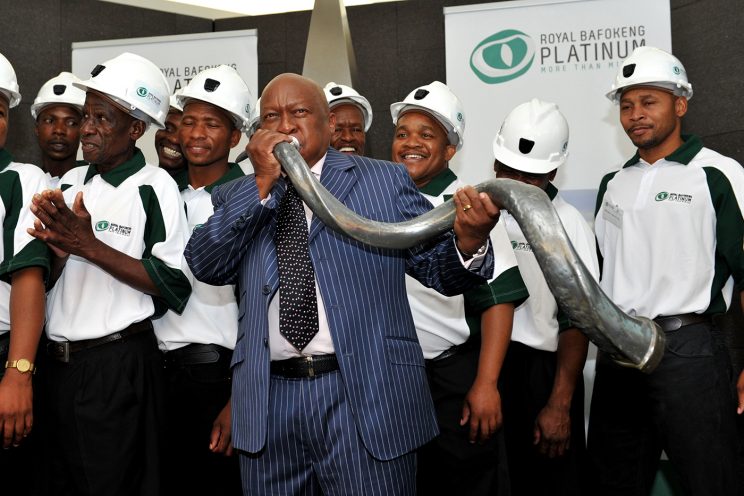Royal Bafokeng Platinum joins JSE delistings rush

Royal Bafokeng Platinum (RBPlat) is the latest to join the march for the JSE exit door, as Impala Platinum (Implats) announced it would acquire 100% of the group after a drawn-out tussle with Northam, which last month threw in the towel and pulled out of the bidding war.
Trading in RBPlat shares will be suspended on Wednesday (2 August), followed by delisting in September.
For the year to the end of June 2023, some 14 equity securities delisted from the JSE and other stock exchanges in SA.
And several other delistings are on the cards or being finalised, among them Liberty Two Degrees (L2D), Steinhoff, Advanced Health, and Indluplace Properties. Premier Fishing was delisted on 1 August.
Last month, Steinhoff shareholders voted to dissolve the company and delist it from the JSE, ending one of SA’s most extraordinary corporate scandals.
Liberty Group has also announced that it will delist the real estate investment trust (Reit) L2D.
Advanced Health and Premier Fishing are also on the way out, which will bring to 20 the number of companies saying goodbye to the JSE so far this year.
Only two new listings …
An analysis by Paul Miller of AmaranthCX shows just two new listings on the JSE this year – Copper 360 and Premier Group, which returned to the JSE in March after an 18-year absence.
The 200-year-old company originally listed on the JSE in 1960, but was taken private in 2005 and restructured. Private equity firm Brait raised R3.6 billion through the sale of Premier shares to entities controlled by Christo Wiese, who ends up with 31% of the equity, while Brait retains 47%.
Copper 360 is a small but promising copper mining and processing company based in the Northern Cape, with some unexpectedly high sampling grades from the Rietberg Copper Mine drill core samples announced in July.
Delisting
According to Miller, there are 13 more companies in various stages of distress that have had their securities suspended from trading – usually, a precursor to delisting.
One exception to this was Mantengu Mining – its shares were suspended in 2016 before the suspension was lifted in August 2022.
“This is a bittersweet moment for me. Having been at the helm of RBPlat for 13 years, I have witnessed the contribution that the business has made to the country,” says RBPlat CEO Steve Phiri.
“However, I firmly believe that this is the logical next step for the industry, and it will enable the combined business to build on the solid foundation that has been laid. The merged entity will combine the complementary strengths and talents of our two companies.
“RBPlat becoming a subsidiary of Implats means that the sum of the parts of the two businesses can maintain or enhance the interests of our shareholders, communities, employees and other stakeholders,” he added.
Implats has acquired 98.73% of RBPlat and announced this week that it will invoke Section 124 (1) of the Companies Act by acquiring all outstanding shares. This will result in RBPlat becoming a wholly-owned subsidiary of Implats.
Distortion
Another distortion that puffs up the JSE’s global heft is the practice of counting the full market capitalisation of foreign secondary-listed companies, even though very little of this value is generated in SA.
Companies like British American Tobacco, BHP and Glencore are counted as part of the JSE market cap, even though SA is a relatively insignificant part of their global operations.
More than 60% of the JSE’s total market cap is made up of such companies.
Miller notes that this is not the case for index weightings, where market cap is adjusted to reflect local ownership.
“We must all be wary of the specious arguments that all is well in SA’s public markets because the gross market capitalisation continues to increase or that the average market capitalisation of the 100 largest companies continues to increase,” he says.
“These are both true, however the majority of the gross market capitalisation of the local markets is in fact not local, nor is it owned by local investors, nor does it trade locally.”
Change in policy needed
The JSE has worked hard to attract new listings. Once the current revamp of the listings rules is completed there will be little more that it can do, as its listings requirements and costs are not materially out of line with other markets, says Miller.
“What is out of line is the lack of a policy response from National Treasury.
“There are many interventions that have been successful in other markets and could be tried here – tax-incentivised listed ‘flow-through’ shares to encourage mineral exploration [and] equalising the tax treatment of direct investment in personal share portfolios with the current discriminatory preferential treatment given to institutional investment in pension funds and collective investment schemes,” says Miller.
One recommendation that should help reverse this is to allow direct share portfolios being included in tax-free savings accounts.
“National Treasury seems to favour a concentrated, institutional approach to management of all savings in South Africa – which inevitably suffocates the smaller end of the exchange,” says Miller.
“What we need is a much wider diversity of non-institutional investors participating in a public market. Neither the policy maker nor the incumbent institutions want this.”
The inevitable result is a 20-year decline in the number of listed companies.

